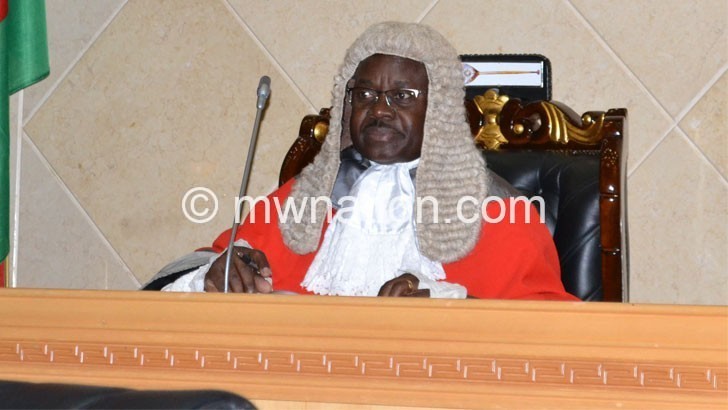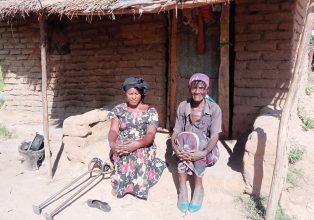Supreme court holds the key
Parties to the May 21 2019 presidential election nullification appeal yesterday presented their respective cases to the seven-judge panel of the Malawi Supreme Court of Appeal.
In his concluding remarks, Chief Justice Andrew Nyirenda said the court, whose decision will set a precedent in interpretation of electoral laws and define management of future elections, will in due course communicate to the parties the date of judgement.
The day started with lawyers representing President Peter Mutharika of Democratic Progressive Party presenting their case for overturning the February 3 2020 judgement of the five-judge panel of the High Court of Malawi sitting as the Constitutional Court (ConCourt). They were followed by lawyers representing Malawi Electoral Commission (MEC) as second applicant for the matter.

Time management was strictly observed as each party was restricted to making their case within one hour stipulated by the court. The two applicants made their case in the morning.
The afternoon was the turn of the two respondents in the appeal case: the country’s estranged Vice-President Saulos Chilima who contested the election on a UTM Party ticket and Malawi Congress Party president Lazarus Chakwera. Ironically, the two were petitioners in the ConCourt.
Nyirenda alongside six other justices of appeal Edward Twea, Frank Kapanda, Lovemore Chikopa, Rezine Mzikamanda, Anaclet Chipeta and Anthony Kamanga patiently listed the submissions from the lawyers representing parties in the case.
Like they did during the lenthy hearing in the ConCourt, both Chilima and Chakwera were present in the courtroom and followed the proceedings donning masks, one of the precautionary measures for the novel coronavirus (Covid-19).
Instead of going straight to the prepared arguments, lawyer Samuel Tembenu representing Mutharika asked the court to consider the amended and additional skeletal arguments as part of the first applicant’s submissions in the appeal case.
He said: “My request is simply a plea that probably when we finish with our arguments, the court should be kind enough as it determines the matter to take skeletal arguments.”
Tembenu, a former minister of Justice and Constitutional Affairs, said the additional submission were valuable; hence, should be considered.
But Nyirenda said the court had taken a position not to allow late submissions.
He said: “But you have raised it [the issue]. You have left it with us. If we want to reflect on it again further, we will do that in due course.”
Presenting his core arguments, Tembenu said the ConCourt erred in nullifying the presidential election in the May 21 2019 Tripartite Elections because the irregularities detected did not affect results of the election.
He also faulted the lower court for applying what he called the qualitative approach in its judgement , stating that the five-judge panel did not abide by its principles.
Said Tembenu: “An election will be invalidated if irregularities or errors complained of did affect the result of the election… It is important that before the decision is made there has to be every effort made to get to the root of the problem.”
Taking his turn, MEC lawyer Tamando Chokotho faulted the ConCourt for making its own interpretation on what the majority means. He argued that the 50 +1 is not what it means to be a majority vote, but rather the first-past-the-post.
In their judgement, the ConCourt judges comprising Healey Potani, Dingiswayo Madise, Ivy Kamanga, Redson Kapindu and Mike Tembo unanimously ruled that Mutharika was not duly elected because there were irregularities and he did not attain the majority vote.
The ConCourt subsequently ordered a fresh election within 150 days of its judgement and directed Parliament to make some legislative provisions that would support the 50+1 constitutional provision.
Representing Chilima as the first respondent in the appeal, lawyer Chikosa Silungwe asked the Supreme Court to throw out the appeal, saying MEC and Mutharika did not file a competent appeal. He said if it was a competent appeal, then it was not filed on merit.
He contended that the electoral body failed to demonstrate that the appeal filed was done in the interest of the public. He said MEC did not have a test of public interest before appealing.
On the issue of 50+1, Silungwe said the lower court applied the law of precedence; hence, it did not err to nullify the election on the ground that the President was not duly elected by the majority.
Mordecai Msisha, leading Chakwera’s legal team, supported Silungwe on the issue, but also faulted MEC on how it resolved some of the complaints lodged as well as the delegation of powers of the commission to chief elections officer Sam Alfandika.
He said: “The commission is a tribunal and if it is a tribunal, its decisions can be appealable… It cannot delegate the core functions of the commission.”
In his submission, Silungwe also pleaded with the court to order Mutharika to fire commissioners of the electoral body within seven days after judgement.
MEC has set July 2 2020 for the fresh presidential election as ordered by the ConCourt. The date falls a day before expiry of the 150 days.
But the decision of the Supreme Court, which earlier dismissed MEC’s application to put aside the ConCourt judgement pending the appeal, holds the key to the future of the fresh election. If it upholds the judgement, the fresh election will proceed and if it overturns it, there will be no election.





